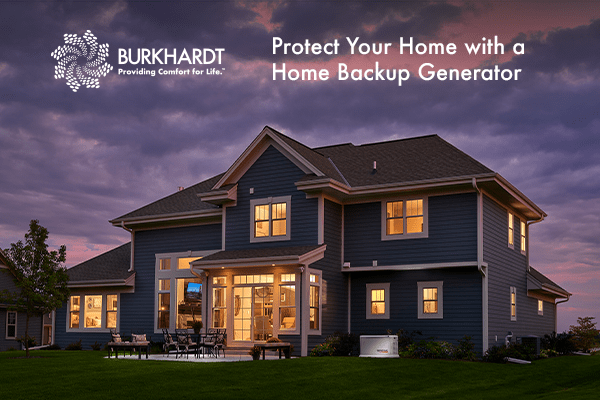Disclosure :: This post is sponsored by Burkhardt Air Conditioning, Heating, Electrical & Generators and written by local mom, and NOM contributor, Joey Rando Yearous.
Protect Your Home With a Backup Generator
 My name is Joey Rando Yearous and I’ve been a contributing writer for New Orleans Mom since 2020. You may already know me from recipe posts like my homemade king cake or my stuffed artichoke casserole, or maybe from “mom hacks” posts like organizing your kids’ clothes or making your pantry look Pinterest-worthy. I currently have three kiddos ages three and under, so I’m all about making life easier however I can, especially since I also work full-time.
My name is Joey Rando Yearous and I’ve been a contributing writer for New Orleans Mom since 2020. You may already know me from recipe posts like my homemade king cake or my stuffed artichoke casserole, or maybe from “mom hacks” posts like organizing your kids’ clothes or making your pantry look Pinterest-worthy. I currently have three kiddos ages three and under, so I’m all about making life easier however I can, especially since I also work full-time.
I began selling whole-home generators as a Solutions Specialist with Burkhardt Air Conditioning, Heating, Electrical & Generators shortly after Hurricane Ida. Despite living in this area my entire life and having over a decade of electrical sales experience, I was shocked to learn that a lot of what I thought I knew about whole-home generators prior to starting this job was incorrect.
Investing in a whole-home generator is a very smart move for homeowners who live in outage prone areas like ours. Since they are such an in-demand product these days, I wanted to address some of the most common questions that come up during my consults.
What is an automatic whole-home standby generator?
An automatic standby generator is a backup electrical system that operates without the need to manually throw an on/off switch, which means you don’t need to be home in order for it to run. It operates on natural gas or liquid propane and sits outside your home just like your central air conditioning unit. Within about 10-30 seconds of an outage, your automatic transfer switch tells the generator to turn on to supply power directly to your home’s electrical panel. Once utility power returns, the generator cools itself off, shuts itself down, and awaits the next outage. There are two basic types of automatic whole-home generators: air-cooled units and liquid-cooled units.
What is the difference between an air-cooled generator and a liquid-cooled generator?
The engines! Air-cooled generators are smaller units with engines that use fans to force air across the engine for cooling. Liquid-cooled radiators are larger units that feature a contained radiator system which cycles coolant through the engine, a lot like the engine of a car.
What does installing a whole-home generator involve?
Installing a generator requires a transfer switch and a dedicated gas line for the generator to run. Burkhardt is licensed to handle both the electrical and natural gas during the installation and doesn’t subcontract that work. (If your generator will be running on liquid propane, your propane company will handle that portion of the installation.) While most homeowners prefer the generator to be installed on the side of their home where it’s generally out of sight, parish codes sometimes make this impossible and we must use the backyard.
Are whole-home generators safe? What about the carbon monoxide issues I’ve heard about on the news?
Yes, when they are properly installed to code, whole-home generators are safe. Because the generator is a large engine running in close proximity to your home, the carbon monoxide it emits is a very real safety risk. Carbon monoxide can travel from a running generator into a home through openings like dryer vents, exhaust fans, and even ventilated soffit. This is why it is in your family’s best interest to have your generator installed by a reputable company like Burkhardt that strictly adheres to the ever-changing codes and follows the permitting and inspection process of your parish.
Why should I choose a whole-home generator instead of a portable generator?
The American Red Cross recommends permanently installed backup generators as a safer way to provide backup power to a home than a portable generator. With an automatic backup generator properly installed outside, your home is protected from deadly carbon monoxide poisoning that is a much greater risk with portable generators. Backup generators provide protection 24/7, whether you’re at home or away, and they turn themselves off when utility power returns. And because whole-home generators use your home’s natural gas or propane fuel supply, you do not need to worry about securing or refilling gasoline to keep your home powered.
What does it take to maintain a whole-home generator?
All generators require periodic maintenance, such as oil and filter changes to ensure maximum performance for years of reliable service. Scheduled annual maintenance visits with an authorized dealer like Burkhardt make for a worry-free ownership experience. Burkhardt can also help you get maintenance after a prolonged power outage, as the oil will likely need to be changed.
Why choose Burkhardt Air Conditioning, Heating, Electrical & Generators?
As part of the trusted generator services provided, Burkhardt’s NATE-certified technicians will be more than happy to install the perfect generator for your home and your budget. Comfort and safety are top priorities for you and your family, so we offer only the top generator brands for you to choose from such as Generac and Kohler Power. When you need generator solutions for your home, rely on Burkhardt Air Conditioning, Heating, Refrigeration & Generators to meet your needs. Call us today for friendly, professional assistance with your generator.
















